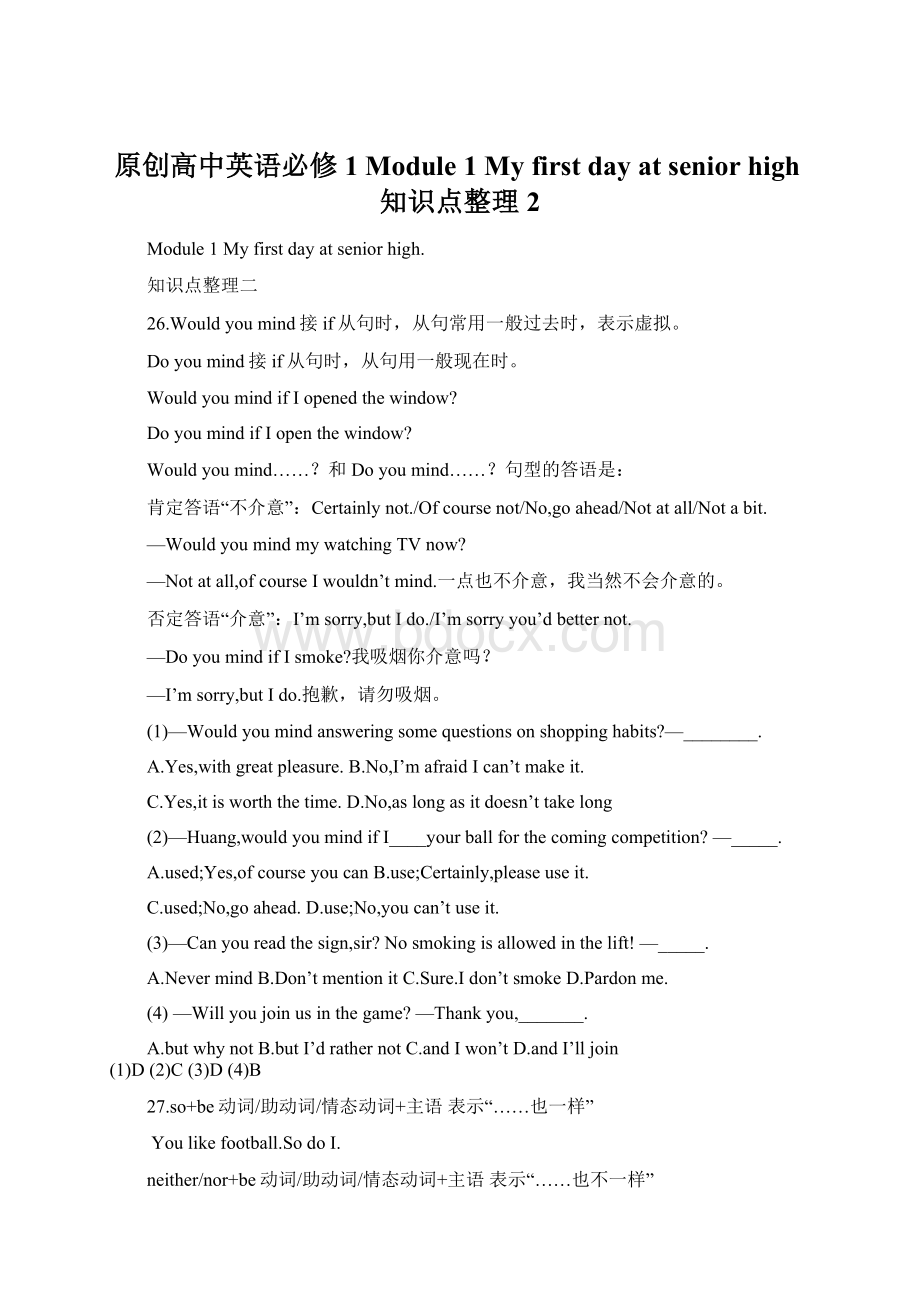原创高中英语必修1 Module 1 My first day at senior high知识点整理2Word文档格式.docx
《原创高中英语必修1 Module 1 My first day at senior high知识点整理2Word文档格式.docx》由会员分享,可在线阅读,更多相关《原创高中英语必修1 Module 1 My first day at senior high知识点整理2Word文档格式.docx(15页珍藏版)》请在冰豆网上搜索。

Yes,ofcourseyoucanB.use;
Certainly,pleaseuseit.
C.used;
No,goahead.D.use;
No,youcan’tuseit.
(3)—Canyoureadthesign,sir?
Nosmokingisallowedinthelift!
A.NevermindB.Don’tmentionitC.Sure.Idon’tsmokeD.Pardonme.
(4)—Willyoujoinusinthegame?
—Thankyou,_______.
A.butwhynotB.butI’drathernotC.andIwon’tD.andI’lljoin
(1)D
(2)C(3)D(4)B
27.so+be动词/助动词/情态动词+主语表示“……也一样”
Youlikefootball.SodoI.
neither/nor+be动词/助动词/情态动词+主语表示“……也不一样”
Youarenotadoctor.Norishe.
soitis/waswithsb=itis/wasthesamewithsb用于既有肯定又有否定或既有系动词又有实义动词的情况,意为“……也是这样的”
Johnlikesfishbuthedoesn’tlikemeat,soitiswithMary.
Hisfavoritefoodisbread,buthedoesn’tlikebreadwithbutter.Andsoitiswithhismother./Itisthesamewithhismother.
so+主语+be动词/助动词/情态动词表示对前文提及的情况给予肯定。
意为“的确/确实是这样的”
主语+be动词/助动词/情态动词+so表示该句的主语重复了前文中的动作。
意为“某人照办了”
Theteacheraskedmetofetchsomechalk,andIdidso.
(1)—Idon’tknowaboutyou,butI’msickandtiredofthisweather.
—____.Ican’tstandallthisrain.
A.Idon’tcareB.It’shardtosayC.SoamID.Ihopeso
(2)—Iremindedyounottoforgettheappointment.—______.
A.SoyoudidB.SoIdonotC.SodidyouD.SodoI
(3)—Iwouldnevercometothisrestaurantagain.Thefoodisterrible!
A.NoramIB.NeitherwouldIC.SamewithmeD.SodoI
(4)Yousayhegoestoworkbybike,____,and____.
A.sohedoes;
soyoudoB.sohedoes;
sodoyouC.sodoeshe;
sodoyouD.sodoeshe;
soyoudo.
(1)C
(2)A(3)B(4)B
28.有无冠词时意义不同的短语:
attable就餐atthetable坐在桌边
inhospital住院inthehospital在医院
gotoprison入狱gototheprison去监狱
gotobed上床睡觉gotothebed去床边
TheywereattablewhenIgottohishouse.当我到家时,他们正在吃饭。
Shesatatthetable,lookingoutofthewindow.她坐在桌旁,看着窗外。
Ifyoubreakthelaw,you’llgotoprison.如果你违反法律,你会坐牢的。
Healwaysgoestotheprisontoseehisfatherwhowascaughtthreeyearsago.
他经常去监狱探望三年前被抓进监狱的爸爸。
MyfatherwasilllastSunday.Heisin____hospitalnow.
A.theB.aC.anD./D
29.现在进行时表将来一般现在时表将来的区别:
现在进行时表示将来,其计划性较强,并往往暗示一种意图,现在进行时表将来时常有“意图”“安排”或“打算”的含义。
这种现在进行时比较生动,给人一种期待感。
一般现在时表示将来,则其客观性较强,即通常被视为客观事实,多指按时刻表或规定要发生的情况。
这主要用来表示在时间上已确定或安排好的事情。
常表示汽车火车飞机轮船定点到达和出发,学校定期开学等等
Thetrainleavesatsixtomorrowmorning.
TheschoolbeginsinSeptember;
I’mgoing.我要走了。
Whenareyoustarting?
你什么时候动身?
比较:
I’mnotgoingoutthisevening.今晚我不准备出去。
Whattimedoesthetrainleave?
火车什么时候开?
注意:
如果主语是train,concert,programme等表示事物的名词,动词通常一般现在时表将来,而不用进行时。
如:
Whattimedoesthetrainleave?
(1)—HaveyouseenJackrecently?
—No.He____foranothercompanynow.
A.isworkingB.hadworkedC.workedD.wasworking
(2)—Thankyouforyourcoffee.—Butyou____it.
A.didn’tdrinkB.aren’tdrinkingC.don’tdrinkD.hadn’tdrunk
(3)—It’ssaidthatyourjourneywasnotverypleasant.
—Wewouldhaveenjoyedourselves,butthecar_____alittlecrowded.
A.wouldbeB.hadbeenC.wasD.wouldhavebeen
(4)Thecar____thetrucksoclosely,otherwisethetrafficaccidentcouldhavebeenavoided.
A.shouldn’tfollowB.wasfollowingC.hasbeenfollowingD.mustn’tfollow
(5)Theboy___hotontheforehead,sohemustbesenttohospitalatonce.
A.isfeltB.isfeelingC.feelsD.hasfelt
(6)Thenewscameasnosurprisetome.I_____forsometimethatthefactorywasgoingtoshutdown.
A.haveknownB.hadknownC.knewD.wasknowing
(7)Thewetweatherwillcontinuetomorrowwhenacoldfront冷锋___toarrive.
A.willbeexpectedB.isexpectingC.expectsD.isexpected
(8)Linda,makesurethetables___beforetheguestsarrive.
A.besetB.setC.aresetD.aresetting
(9)____hard?
Whydon’ttheystopworking?
A.Isn’titrainingB.Hasn’titrainedC.Won’titrainD.Wasn’titraining
(10)Itseldom____herebutit____heavilythesedays.
A.snows;
snowsB.snows;
issnowingC.issnowing;
issnowingD.issnowing;
snows
(11)Thestory_____howayoungmanbecomesafinecommunist.
A.describleB.isdescribingC.describedD.describes
(12)“Themoment___soon,”hethoughttohimself,waitingnervously.
A.cameB.hascomeC.wascomingD.iscoming
(13)—Joan,what_____inyourhand?
—Look!
Itisabirthdaygiftformygrandma.
A.hadyouheldB.areyouholdingC.doyouholdD.willyouhold
(14)Mum,IwaswonderingifyoucouldlendmeafewdollarsuntilI____onFriday.
A.getpaidB.gotpaidC.havepaidD.hadbeenpaid
(15)Hurryup!
MarkandCarol______us.
A.expectB.areexpectingC.haveexpectedD.willexpect
(16)OnMondaymorningsitusually____meanhourtodrivetoworkalthoughtheactualdistanceisonly20miles.
A.takesB.istakingC.tookD.willtake
(17)AMidsummerNight’sDream____attheTheatreRoyalon19thJune,andthentoursthroughtScotland.
A.opensB.isopenedC.willopenD.willbeopened(open开始,启动)
《仲夏夜之梦》6月19日在皇家剧院首演之后会在整个苏格巡回演出。
(18)Thetrain____forBeijingat8:
30.Wemusthurryup.
A.willleaveB.leftC.leavesD.hasleft
(1)A
(2)A(3)C(4)B(5)C(6)B(7)D(8)C(9)A(10)B(11)D(12)D(13)B(14)A(15)B(16)A(17)A(18)C
30.下列动词常用于一般现在时,而不用于进行时:
表示感官的动词:
see,hear,smell,sound,taste,feel
表示情感的动词:
like,love,prefer,hate,want,hope,wish
表示存在状态的动词:
be,existɪɡ'
zɪst存在,stay,remain
表示占有与从属的动词:
have,belong,consistkən'
sɪst由……组成,在于
Helikesdrawingverymuch.
Ipreferridingtoschooltotakingabus.
Yourideasoundsgood.
31.就一般的-ing形式和-ed形式而言,绝不可以说“-ing形式修饰事物,-ed形式修饰人”,一定要从词义上,并结合句子的具体意思进行区分。
请看下面的例子:
Sheisaninterestingwriter,andI’minterestedinthesubjectsthatshewritesabout.
她是一位有趣的作家,我对她写的题材很感兴趣。
Theboyisreallydisappointing.Heisalwaysmakingtroubleinclass.这个男孩的确令人失望。
他总是在课堂上捣乱。
Theboywasdisappointedwithhisresults.这个男孩对他的成绩感到失望。
Therewasasurprisedlookonhisfacewhenheheardthenews.
听到这一消息,他脸上露出惊讶的表情(surprised修饰“look表情”,是指他本人感到惊讶)
(1)MrSmithisa____teacher.Everybodyis_____togetclosetohim.
A.frightening;
frighteningB.frightened;
frightened
C.frightened;
frighteningD.frightening;
(2)Shesaidnothing.And_____tearscametohereyes.
A.tiredB.tiringC.excitingD.excited
激动的泪水
(3)The________expressiononherfacesuggestedshewas________whensheheardthenews.
A.amazing;
amazedB.amazed;
amazingC.amazed;
amazedD.amazing;
amazing
(4)Thoserelativeswere____people.Afterafewdays,Iwasgetting____andhomesick.
A.boring;
boringB.bored;
boredC.bored;
boringD.boring;
bored
(1)D
(2)D
(3)答案Camazing“令人吃惊的”;
amazed“感到吃惊的”,但本题中她脸上的表情应是她感到吃惊后产生的表情,而非表情是令人吃惊的,故用amazed修饰expression。
(4)D
32.matter的用法:
mattervi要紧,有关系(用于疑问句、否定句或条件句中)
Doesitmatterifanengineerisamanorawoman?
工程师是男是女又有什么关系呢?
Itdoesn’tmattertomewhatyoudo.做什么对我并不重要。
Youcanstayhereforanotherweek,oryoucangobackhometomorrow.Itdoesn’tmattertome.
你可以在这儿再住一周,或者明天就回家。
这对我并不重要。
—Sorry,Ikeptyouwaiting.—Itdoesn’tmatter.
mattern事件,问题
nomatter(相当于副词,与疑问词连用,引导让步状语从句):
Nomatterhowhardyoutry,youwillneverbesuccessful.不管你如何努力,你都不会成功的。
(1)—CanIlookatthemenuforafewmoreminutesbeforeIdecide?
—Ofcourse,____,sir.
A.MakeyourselfathomeB.EnjoyyourselfC.Itdoesn’tmatter.D.Takeyourtime
(2)Ican’tsaywhichwineisbest—it’sa(n)______ofpersonaltaste.
A.affairB.eventC.matterD.variety
我说不出哪种酒最好,因为这是个人口味的问题。
(3)—I’msorryfornothavingtoldyouthenewsearlier.—_____.
A.EnjoyyourselfB.MakeyourselfathomeC.Itdoesn’tmatterD.Takeyourtime.
(4)Thethingthat____isnotwhetheryoufailornot,butwhetheryoutryornot.
A.mattersB.caresC.thinksD.minds.
(1)D
(2)C(3)C(4)A33.C35.C
33.fluency‘flu:
ənsin[U](尤指外语)流利,流畅形容词是fluent’flu:
ənt;
副词是fluently。
FluencyinJapaneseandEnglishisrequiredforthisjob.
这个工作要求日语和英语熟练自如。
Shepractisedalottoachieve/developgreaterfluency.
为了达到更加流畅的水平,她练习了很多。
HespokeEnglishwellindeedɪn’di:
d的确,butofcoursenot_____anativespeaker.
A.asfluentasB.morefluentthanC.sofluentlyasD.muchfluentlythan
34.辨析:
abit和alittle
(1)都可以修饰形容词、副词的原级和比较级。
(2)都可用作名词短语,在句中作主语、宾语。
Pleasegivemeabit/alittle。
请给我一点吧。
(3)修饰名词时,abit后需加of.alittlewater=abitofwater
(4)在否定句中两者意义完全不同。
notabit=notatall一点也不notalittle=very(much)很,非常
(5)alittle=abit=alittlebit=kindof修饰形容词或副词
35.callat访问(后接表示地点的名词或代词)IcalledatyourofficeasIwaspassing,butyouwereout.我路过时去了你的办公室,但你出去了。
callon/upon要求;
号召;
拜访(后接表示人的名词或代词)MrWhitehasjustcalledonMrsZhutogiveheramessage.怀特先生刚来拜访了朱夫人,带给她一个口信。
callin邀请,找来Thechildisseriouslyill;
heneedstocallinadoctorimmediately.这孩子病
得厉害,他需要立刻请个大夫。
callup给……打电话Callmeuptomorrow.
callfor需要;
要求;
(去某处)接人或物Successcallsforhardwork.成功要靠勤奋。
calloff取消,停止做……I’vecalledoffthetrip.
callout要求某人来,召集(尤指处理紧急情况)
TheSomalirobbers’frequentattacksontheseaurgedtheUnitedNationsto____allnationstotakeimmediateaction.
A.fightforB.applyforC.callonD.waiton
索马里海盗在海上频繁的袭击促使联合国号召所有的国家立刻采取行动。
36.way后的定语从句可以用inwhich或that来引导,或省略。
(1)Whatsurprisedmewasnotwhathesaidbut____hesaidit.
A.thewayB.inthewaythatC.inthewayD.thewaywhich
(2)Theway____hethoughtoftosolvetheproblemisacleverone.
A.howB.thatC.inwhichD.inthat
(3)Id